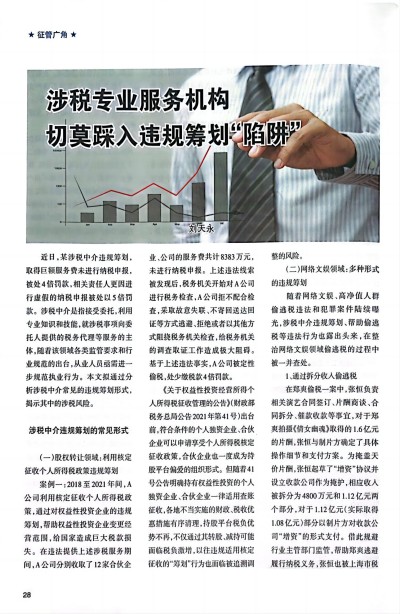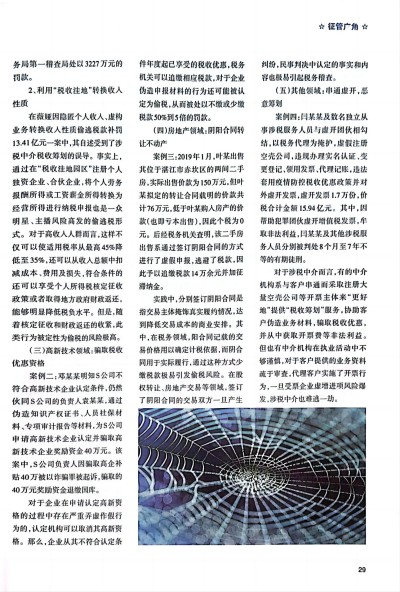Liu Tianyong, Lawyer at Hwuason Law Firm, Publishes "Tax-related professional service organizations should not step into the "trap" of irregular planning” in "Taxation and Levy"



Tax-related Professional Service Organizations Must Not Step into the Trap of Illegal Planning
Liu Tianyong
Recently, a tax-related intermediary was fined four times for obtaining huge service fees without tax declaration in violation of the planning rules, and the responsible person was even fined five times for making false tax declaration. Tax-related intermediary refers to the main body that accepts entrustment, uses professional knowledge and skills, and provides tax agent and other services to the principal on tax-related matters. With the introduction of various regulatory requirements and industry norms in this field, practitioners are in urgent need of further standardization of practice behaviors. This article is intended to analyze the common forms of tax-related intermediaries' irregular planning and reveal the tax-related risks therein.
I. Common Forms of Tax-Related Intermediaries' Illegal Planning
(i) In the field of equity transfer: illegal planning by utilizing the approved collection of individual income tax policy
Case 1: Between 2018 and 2021, Company A utilized the approved collection of individual income tax policy to help equity investment enterprises change their business scope through illegal planning of equity investment enterprises, causing huge tax losses to the state. During the period of providing the above tax-related services in violation of the law, Company A received service fees totaling RMB 83.83 million from 12 partnerships and companies respectively, and did not file tax returns. After the discovery of the above illegal clues, the tax authorities started to carry out tax inspection of Company A. Company A refused to cooperate with the inspection, and took such means as deliberately losing contact with the tax authorities, not sending back the return of service, etc. to evade, refuse or otherwise obstruct the inspection of the tax authorities, which caused great obstacles to the tax authorities in their investigation and collection of evidence. Based on the above facts of violation, Company A was characterized as tax evasion and was fined four times of the underpaid tax.
Prior to the introduction of the Announcement on the Administration of Collection of Individual Income Tax on Income from Equity Investment and Operation (Announcement No. 41 of the Ministry of Finance and the State Administration of Taxation of 2021), qualified sole proprietorships and partnerships were allowed to apply for enjoyment of the policy of approved collection of individual income tax, and partnerships had once become the preferred form of organization for equity holding platforms. However, with Circular No. 41 clarifying that all sole proprietorships and partnerships holding equity investments are subject to the checking and levying policy, and the financial and tax incentives improperly implemented in various places being cleaned up in an orderly manner, shareholding platforms no longer have any advantage in terms of tax burden, and not only are they likely to face a sharp increase in tax burden through the transfer of their shares and reduction of their holdings, but also face the risk of retroactive adjustments to the "planning" behavior of the illegal application of the approved levies in the past. Not only may they face a surge in tax liabilities for transferring and reducing their holdings through them, but they also face the risk of retrospective adjustments to their previous "planning" behavior in violation of the approved levy.
(ii) Network entertainment: various forms of illegal planning
With the successive exposure of illegal and criminal cases of tax evasion and avoidance in the field of network entertainment and high net-worth individuals, tax-related intermediaries' illegal planning and helping tax evasion and avoidance behaviors have also come to light, and have been investigated and dealt with in the process of remedying tax evasion in the field of network entertainment.
First,Tax evasion by splitting income
In the case of tax evasion of Zheng Shuang, Zhang Heng was responsible for the signing of the relevant acting contract, negotiation of remuneration, contract splitting, collection of money, etc. For the remuneration of 160 million Yuan obtained by Zheng Shuang for shooting of Sinister Spirit, Zhang Heng and the producer determined the specific details of the operation and payment program. In order to cover up the overpriced film remuneration, Zhang Heng drafted the "capital increase" agreement and set up the collection company as a cover, the corresponding income was split into 48 million yuan and 112 million yuan two parts, for 112 million yuan (the actual acquisition of 108 million yuan) part of the producer to the collection company "capital increase The part of 112 million yuan (108 million yuan actually obtained) was paid in the form of "capital increase" by the producer to the collection company. By this way, to circumvent the supervision of industry authorities and help Zheng Shuang to evade the fulfillment of tax obligations, Zhang Heng was also fined 32.27 million yuan by the First Inspection Bureau of Shanghai Municipal Taxation Bureau.
Second,Using "tax depressions" to convert the nature of income
In the case of 1.341 billion RMB fine for tax evasion by hiding personal income and converting the nature of income by fictitious business, Via said that she was misled by tax planning of tax-related intermediaries. In fact, through the registration of individual sole proprietorships and partnerships in "tax depression zones", the conversion of personal income from labor compensation or salary income into business income for tax declaration is also a group of stars and anchors of high-risk forms of tax evasion. For high-income people, this not only can make the applicable tax rate from the highest 45% down to 35%, but also from the total income can be deducted from the costs, expenses and losses, eligible for personal income tax can also enjoy the approved collection policy or to obtain the local government financial rebate, can significantly reduce the level of tax burden. However, with the tightening of the approved levy and fiscal refund, the risk of such behavior being characterized as tax evasion is extremely high.
(iii) High-tech field: fraudulent tax preference qualification
Case 2: Deng Moumou knew that Company S did not meet the conditions for the identification of high-tech enterprises, but still, together with Yuan Moumou, the person in charge of Company S, applied for the identification of high-tech enterprises and fraudulently obtained 400,000 yuan of incentive funds for high-tech enterprises for Company S by forging intellectual property rights certificates, social security materials of the personnel, and special auditing reports and other materials. In the case, the person in charge of Company S was prosecuted for fraud for obtaining 400,000 yuan of high-tech enterprise subsidies, and the fraudulent 400,000 yuan of incentive funds were returned to the state treasury.
For the enterprise in the process of applying for the recognition of high-tech qualification, there are serious fraudulent behavior, the recognition agency can cancel its high-tech qualification. Then, the tax authorities can recover the corresponding tax for the tax incentives enjoyed by the enterprise from the year it does not meet the qualification conditions, and the enterprise's behavior of forging declaration materials may be regarded as tax evasion, which may be punished with a fine of 50% to 5 times of the non-payment or underpayment of the tax.
(iv) Real estate sector: transfer of real estate under a shady or illegitimate contract
Case 3: In January 2019, Ye Mou sold his two second-hand houses located in Chikan District, Zhanjiang City, the actual sale price of 1.5 million yuan, but Ye Mou drew up a transfer contract contained a total of 760,000 yuan, which is lower than the price at which Ye Mou purchased the property (i.e., sold it at a loss), and therefore the individual tax is 0 yuan. After the tax authorities found that the sale of the second-hand house is through the signing of a shady or illegitimate contract for false declarations, to avoid the tax, and therefore be recovered more than 140,000 yuan of tax and late payment fees.
In practice, the signing of shady or illegitimate contracts refers to the commercial arrangement whereby the subject of the transaction disguises the true performance and reduces the cost of the transaction. In the field of taxation, the transaction price recorded in the public contract is used to determine the basis for tax calculation, while the sham contract is used for actual performance, and underpayment of tax in this way is very likely to lead to the risk of tax evasion. In the field of equity transfer, real estate transactions, signed a shady or illegitimate contract of the two parties to the transaction, once the dispute, the civil judgment found in the facts and content is also very easy to cause tax audits.
(v) other areas: collusion false opening, malicious planning
Case 4: Yan Moumou and several independent tax-related service personnel colluded with the false invoicing gangs, tax agents as a cover, false registration of shell companies, irregularities in real-name authentication, change of registration, receipt of invoices, agent bookkeeping, illegal use of epidemic prevention and control of tax incentives and external invoicing, false invoicing 17,000, the total amount of price and tax 1.594 billion yuan. Among them, because of helping criminal gangs to falsely open VAT invoices and make illegal profits, Yan Moumou and other tax-related service personnel were sentenced to prison terms ranging from 8 months to 7 years.
For tax-related intermediaries, some intermediaries collude with their clients to register a large number of shell companies and other invoicing entities to "better" provide "tax planning" services, assist their clients in forging business materials, cheat tax concessions, and obtain invoicing fees and other illegal benefits. Illegal benefits. However, some intermediaries are not cautious enough in their practice activities, and they are negligent in examining the business information provided by their clients and carry out invoicing behavior on behalf of their clients, and once the risk of false enhancement of items of the invoiced enterprises breaks out, it is difficult for tax-related intermediaries to escape from the disaster.
II.Tax Risks of Illegal Tax Planning by Tax-Related Intermediaries
Tax-related intermediaries, as professional subjects engaging in fiscal and taxation agency and implementing tax planning, will also trigger their own administrative and criminal risks if they help taxpayers evade tax in the name of tax planning.
(i) Administrative Liability of Tax-Related Intermediaries for Tax Planning Violations
If a tax-related intermediary violates tax laws and administrative regulations and causes the client to fail to pay or underpay tax, the tax authorities can penalize the taxpayer in accordance with Article 63(1) of the Tax Collection and Administration Law, and in accordance with Article 93 of the Rules for the Implementation of the Tax Collection and Administration Law, as the tax-related intermediary illegally provides other convenience for the taxpayer to fail to pay or underpay tax, the tax authorities can, in addition to confiscating the illegal income, impose a penalty of failing to pay tax or underpaying tax, or impose a penalty of failing to pay tax on the taxpayer. In addition to confiscating their illegal income, they may also impose a fine of up to one times the amount of unpaid or underpaid tax. According to Article 15 of the Measures for the Supervision of Tax-Related Professional Services (for Trial Implementation), the tax authorities may list the tax-related intermediaries with the above illegal behaviors as the key supervisory objects, lower the credit rating or include them in the credit record, and suspend the acceptance of the tax-related businesses represented by them (for a period of not more than six months); and may, based on the severity of the circumstances, make decisions on the inclusion of them in the list of tax-related services of loss of credibility, the exclusion of the tax-related services of the tax-related intermediaries, the declaration of the "Taxation Service List" and the declaration of the "Taxation Service List". The company may also, depending on the seriousness of the case, be included in the list of tax-related services with loss of trust, not be accepted for the tax-related business it represents, declare the Certificate of Administrative Registration of Taxation Firms as invalid, and request the market supervision department to revoke its business license.
(ii) Criminal Liability of Tax-Related Intermediaries for Illegal Tax Planning
On the one hand, if the taxpayers who carry out tax planning in violation of the law are held criminally liable for tax evasion, the tax-related intermediaries who give advice may also be implicated in the criminal risk of helping tax evasion; on the other hand, in the process of the tax-related intermediaries providing the clients with the traditional fiscal and taxation agency services, even if they issue invoices according to the clients' instructions and the information provided, the tax-related intermediaries may not be able to provide the tax-related services to the clients, and the tax-related intermediaries will not be able to do so. On the other hand, in the process of tax-related intermediaries providing traditional fiscal and taxation agency services for clients, even if they only issue invoices based on the instructions and information provided by the clients, due to the appearance of the subject of invoicing, tax-related intermediaries are also very likely to be implicated in the criminal risk of the crime of false invoicing if there is a false invoicing issue by the clients. However, according to the provisions of Article 205 of the Criminal Law, the crime of false invoicing of VAT requires that the perpetrator "knows that the consequences of his behavior will be harmful to the society", and if the tax-related intermediary can prove that he has done his reasonable duty of examining the materials provided by the client in the process of providing services, he should not be regarded as having the subjective intention of tax fraud. If the tax-related intermediary can prove that it has fulfilled its reasonable examination obligation for the materials provided by the client in the course of providing services, it should not be considered as having the subjective intention of tax fraud. The tax-related intermediary is only in the position of "criminal tool" in the invoicing process and should not be recognized as a criminal according to the law.
To sum up, tax-related intermediaries should regulate their practice behavior in accordance with the basic guidelines for tax-related professional services and the code of professional ethics, and should be alert to the practice risk while guaranteeing the service quality. In the course of daily operation, they should take business authenticity as the basis, record, retain and keep business information, conduct regular tax self-examination and self-correction, prudently approve the whole process of business promotion and do a good job in controlling and reviewing the quality of the business after the completion of the business. By standardizing the business process, we can isolate the tax risks and strengthen the tax compliance.
Author's affiliation: Hwuason Law Firm





